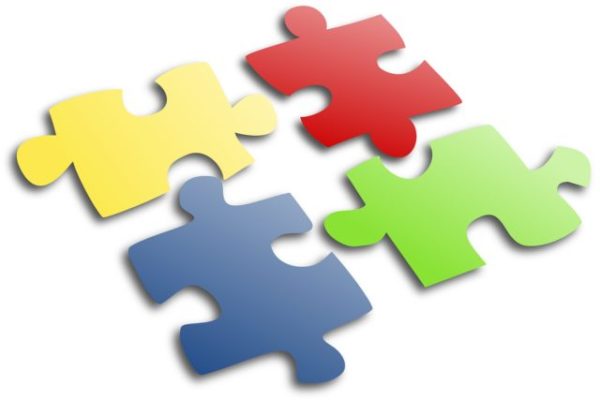When most of us see or hear the word “puzzle,” the first, and perhaps only, type of puzzle that comes to mind is a jigsaw puzzle. Since it was invented over two hundred years ago and was the only type of puzzle most people were familiar with, it rightly became then, and still is now, the puzzle that needs no further description, and I imagine that when many of you first completed a puzzle as a child, you would not have known to call it a jigsaw puzzle without reading the full name on the box or hearing an adult use the term. Now, of course, a jigsaw puzzle is only one of many different types of puzzles you can solve, puzzles can be solved in many different ways, including online, and really, puzzles are everywhere if you know where to look and are able and willing to use as broad a definition of the word as possible. No matter the type of puzzle you choose, and no matter how much fun you have with it, doing puzzles is a great way to develop your study skills, because it encourages the thinking skills related to the specific type of puzzle you are doing while also providing the incentive and motivation to solve a problem. No matter the type of puzzle you enjoy doing, or any type of puzzle a teacher might assign or someone else might encourage you to try, having as much fun with it as possible while attempting to solve it and learn from it is a great way to build study skills.
Though puzzles are meant to be fun, they have had an educational purpose all along as well. Jigsaw puzzles were originally invented to help students learn map skills, crossword puzzles build vocabulary, and Sudoku tests logic. These are but a few of the many skills that doing puzzles can teach, and the more challenging they are, the more they require focus and determination as well. Word seeks and number seeks require close reading skills, while both Sudoku and verbal logic puzzles require process of elimination and other tricks that allow you to discover the correct answers without repeating or missing anything. If you practice any of these types of puzzles, you use skills you can transfer to the answering of different types of homework and test questions, and you can develop the close reading skills you need, not only to figure out the answers, but to read the questions as well.
Completing different types of puzzles can also encourage you to check your work and make corrections where needed. If you are able to do this while still completing the puzzle, that’s great, but don’t be afraid to use the answer key if you are truly stuck. If possible, try to look up only a single answer or part of the puzzle, then use that information to try to solve the rest without looking. Whether you look up all the answers or only those you got stuck on, try to figure out why the correct answers are what they are: reread crossword clues so you can match them with the correct answers, erase and redo Sudoku and verbal logic using the answer key as a guide, look again at the jigsaw puzzle box to figure out why certain pieces don’t fit, etc. Getting into the practice of doing this with puzzles is a great way to encourage yourself to do it when answers to math problems are provided in the back of your text or when a test paper is returned to you. No matter the subject or type of test, one of the best ways to improve both test-taking skills and study skills in general is by making corrections to your work, and/or going over corrections teachers have given you, either on your own or with their or someone else’s help. Whenever you are assigned to make corrections to your work, don’t blow it off. Even if you are legitimately concerned about how much time and effort making corrections might take, and are not simply trying to get a bad grade out of your mind or to cut corners with the effort you are putting into your work, try to find a way to make corrections, assigned or otherwise. It might seem time-consuming and laborious in the short term, but in the long term, it will really pay off. In much the same way, going over answers you missed when completing a puzzle will improve your ability to complete that type of puzzle the next time you attempt it, and even if you don’t see much progress at first, you almost certainly will see it over time.
Just as with the development of your study skills, the completing of various types of puzzles for both enjoyment and learning purposes involves figuring out what works for you. Certain types of puzzles will be much more appealing to you than other types depending on your learning style, and since even jigsaw puzzles have found their way online now, it may be much harder for you to consider completing puzzles using hands-on and/or paper and pencil, as opposed to using your computer or your phone. I’m sure you are expecting me to say that I believe you should always vary the types of puzzles you do, and that you should complete all, or at least most, of them offline. Instead, as with so many study skills, when it comes to doing puzzles, whether in or out of school, I believe that finding the right balance among all possibilities will give you the best chance to both enjoy and learn from doing puzzles. If you enjoy certain types of puzzles and have extra time to spend on them, that’s great, but if you have the opportunity to work on a puzzle that is not as much to your liking, whether in or out of school, try not to simply dismiss it out of hand. Instead, see if you can get some help with it, and try to employ strategies, just as you would when studying, that might make a seemingly impossible puzzle easier to solve. This does not mean that you should spend so much time on an assigned puzzle that it impacts your ability to complete the rest of your work. If you truly feel that completing a puzzle is too time-consuming, particularly if you receive formal accommodations, doing as much as you can in a reasonable amount of time, asking for additional assistance with it, or receiving permission not to work on it at all are all possible solutions, as long as whatever you decide to do is reasonable and you ask for it in a respectful manner. When it comes to deciding whether to complete puzzles online or using other methods, deciding on a case-by-case basis is a much more reasonable choice than dismissing either option without thinking it through. If one way or the other is required for an assignment, you should obviously focus first on using the method that has been assigned to you, but if you find yourself struggling with it more than you think is reasonable, asking to change methods, in either direction, is certainly worth considering. When it comes to completing puzzles for fun, my best piece of advice about whether or not to do them online is to consider your comfort level with each type of puzzle you like to do, because you may well find that you end up using both methods. While I grew up before many traditional puzzles were available in online versions, I now enjoy doing some of them on my phone, especially card games like Solitaire. On the other hand, I tried completing both Sudoku and word search puzzles on my phone and quickly switched back to paper and pencil, for two very different reasons. With Sudoku, I found that I made too many mistakes online, while with word search, I found that paper and pencil better matched the level of challenge I enjoy. With these and any other types of puzzles you might decide to do, whether you use paper and pencil or complete them online is your choice, as long as you remember that there is a choice. Unless you are certain that one method is working just as you want it to, don’t be afraid to try the other, or to mix and match options based on the type of puzzle you are doing. Just as with study skills, so it is with completing puzzles, too – what works for you is whatever will give you the greatest chance at success.
Though it may not seem so at first glance, doing puzzles is a great way to develop thinking and problem-solving skills that can be transferred to your studies. No matter the type of puzzle, whether you only do assigned ones or also enjoy them as a hobby, and whether you do them online, offline, or both, completing puzzles can motivate you to develop the focus and determination to succeed with many types of tasks. Since most of them provide answer keys or other ways by which you can get instant feedback and make corrections where needed, getting the most you can out of checking your work when doing puzzles is a great way to encourage yourself to do the same whenever you are provided with answer keys or are given other ways to receive feedback on your schoolwork and learn from it. Puzzles are meant to be enjoyed, but they also provide many opportunities for learning, and if you strive to become more successful with puzzles, some of the skills you develop while do so will only help you as you strive to become more successful with your studies as well.

